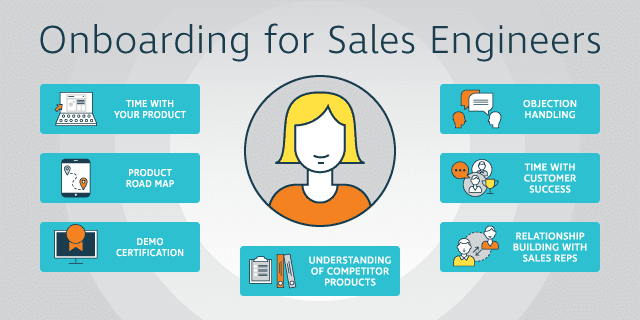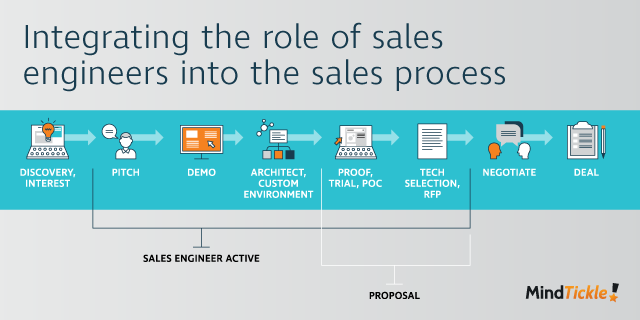Why a Sales Onboarding Program Design for Sales Engineers is Important
Strategic sales onboarding, regardless of team size or role, should be a non-negotiable priority for any company.
Research by the Aberdeen Group backs this up: a recent study found that when onboarded effectively, 71% of employees exceeded expectations, versus a reported 8% by companies without an onboarding strategy. And while it’s a given that every team member needs to learn the same foundations about the company and its culture, different roles require specialized learning.
What’s a sales onboarding program just for sales engineers?
Due to the particular focus on cross-disciplinary skills, the specialized role of the technical sales engineer is a perfect example of the impact effective onboarding can have. Sales engineers bridge the gap between the sales reps and the product: since sales engineers bring deep technical knowledge to the sales process, they need in-depth immersion and training on the product.
This means that basic product training or an overview of APIs, integrations, and use cases are not enough: sales engineers need to know and understand their product like the back of their hands. However, some capabilities that sales engineers need are similar to sales reps: they need to understand their customers and all the ways the product helps them relieve business pain points.
So, what should a sales engineers onboarding include?
Sales engineers need to understand the intricacies of how your product works and be able to apply specific use cases and solutions. They then must be able to explain these to a customer in a way that actually sells your product. To help them become proficient in each of these as quickly as possible, your onboarding should include:
- Time with your product – The role of sales engineers is to know your product inside out. And, they don’t just need to know the features, they must understand how people use the product and be able to demonstrate it. They need to be able to test and put into practice what they’ve learned.
- Detail on your product roadmap – Sales engineers need to understand what the product roadmap looks and how it affects your industry and competitive positioning. This will help them tailor discussions and solutions for customers. During the onboarding process, ask engineering and product development to get involved so they can give your engineers a holistic view of how the product works today and the future product roadmap.
- Certify they can demo – The first time a customer meets an engineer will often be at the product demo. Before the demo, engineers need to understand the customer, their pain points, and needs so they can tailor the demo accordingly. Getting the demo right can make or break the deal. As part of their onboarding let sales engineers see other use cases (recorded or live) and get them to practice different scenarios. They should also be certified in how to complete a tailored demo before meeting a customer. This process ideally will include receiving plenty of feedback from both their peers and managers so they can keep improving and refine their technique.
- Practice objection handling – Considered an expert, technical sales engineers often face the most challenging objections. They not only need to know what to say but also how to say it in a way that keeps the sale in play. This is a learned skill as it can be easy to get caught up in technical details that the customer doesn’t necessarily need to know. Using role plays and scenario-based training, technical sales engineers can make sure they have mastered handling objections.
- Understanding competitor products – To explain to a customer why your product is superior to a competitor’s your sales engineers need to understand exactly what your competitor’s products do and don’t do; not just listed features. Depending on how complex your product is, your sales engineer’s onboarding should include a detailed explanation of your key product differentiators as compared to your competitors. For more complex products, give them access to your competitor’s products and let them spend some time seeing how they work.
- Customer-based Solutions – To give customers real solutions to their problems, engineers need to understand your product in the context of how it works in a business environment. By spending time with your customer success team they can see these use cases in action and perhaps also gather feedback from customers so that they can learn what works and what doesn’t.
- Relationship building with sales reps – Sales engineers need to build relationships with sales reps so that they bring them into their deals and promote overall sales effectiveness. It’s important to help sales engineers build these relationships and you get the ball rolling by onboarding them together where their coursework overlaps. Enabling engineers to shadow sales onboarding and vice versa, sharing technical sales engineer onboarding with the reps – including the checkpoints and certifications they must complete – will help build their relationships.
Leveraging onboarding course for two different sales roles
When developing your onboarding program you can create a range of courses that cover different roles, and then assign those that are relevant based on job role or even location. For example, your course on buyer personas could be assigned to both sales reps and engineers, but your product training modules for each role may be different.
The need for two sets of skills combined into one company representative, as important as a technical sales engineer, means you can leverage the sales enablement courses for:
- General corporate onboarding – policies, culture, and organizational strategy
- Buyer and user personas
- Product positioning and messaging
- Industry trends
While it may be tempting to put your engineers through the same onboarding program as your sales reps, it’s important to remember that this may impact their ability to ramp up quickly and start helping your reps sell. Investing in onboarding your sales engineers is one of the best ways to make sure your new hires – reps and engineers – achieve their quota quicker.




